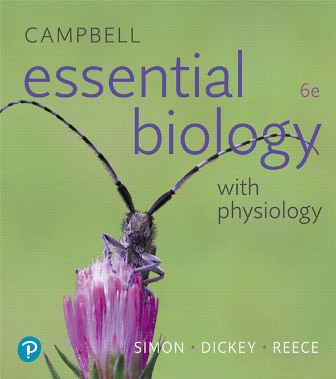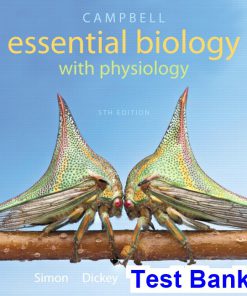Test Bank for Campbell Essential Biology with Physiology, 6th Edition, Eric J. Simon Jean L. Dickey Jane B. Reece
$35.00 Original price was: $35.00.$26.50Current price is: $26.50.
Test Bank for Campbell Essential Biology with Physiology, 6th Edition, Eric J. Simon, Jean L. Dickey, Jane B. Reece
Test Bank for Campbell Essential Biology with Physiology, 6th Edition, Eric J. Simon, Jean L. Dickey, Jane B. Reece

Product details:
- ISBN-10 : 0134711750
- ISBN-13 : 978-0134711751
- Author: ERIC J. SIMON
Teach students to view their world using scientific reasoning with Campbell Essential Biology. The authors’ approach equips your students to become better informed citizens, relate concepts from class to their everyday lives, and understand and apply real data, making biology relevant and meaningful to their world and futures.
The new edition incorporates instructor feedback on what key skills to highlight in new Process of Science essays and uses striking infographic figures in conveying real data to help students see and better understand how science actually works. New author-narrated Figure Walkthrough Videos appear in each chapter and guide students through key biology concepts and processes.
Table contents:
1. Learning About Life
CHAPTER THREAD
Swimming with the Turtles
BIOLOGY AND SOCIETY: A Passion for Life
The Scientific Study of Life
An Overview of the Process of Science
Hypotheses, Theories, and Facts
Controlled Experiments
THE PROCESS OF SCIENCE: Do Baby Turtles Swim?
Evaluating Scientific Claims
The Properties of Life
Major Themes in Biology
The Relationship of Structure to Function
Information Flow
Pathways That Transform Energy and Matter
Interactions within Biological Systems
Evolution
EVOLUTION CONNECTION: Turtles in the Tree of Life
UNIT 1: CELLS
2. Essential Chemistry for Biology
CHAPTER THREAD
Helpful Radiation
BIOLOGY AND SOCIETY: Nuclear Medicine
Some Basic Chemistry
Matter: Elements and Compounds
Atoms
THE PROCESS OF SCIENCE: How Effective Is Radiation in Treating Prostate Cancer?
Chemical Bonding and Molecules
Chemical Reactions
Water and Life
Water
Acids, Bases, and pH
EVOLUTION CONNECTION: Radioactivity as an Evolutionary Clock
3. The Molecules of Life
CHAPTER THREAD
Lactose Intolerance
BIOLOGY AND SOCIETY: Got Lactose?
Organic Compounds
Carbon Chemistry
Giant Molecules from Smaller Building Blocks
Large Biological Molecules
Carbohydrates
Lipids
Proteins
Nucleic Acids
THE PROCESS OF SCIENCE: Does Lactose Intolerance Have a Genetic Basis?
EVOLUTION CONNECTION: The Evolution of Lactose Intolerance in Humans
4. A Tour of the Cell
CHAPTER THREAD
Humans Versus Bacteria
BIOLOGY AND SOCIETY: Antibiotics: Drugs That Target Bacterial Cells
The Microscopic World of Cells
The Two Major Categories of Cells
An Overview of Eukaryotic Cells
Membrane Structure
The Plasma Membrane
Cell Surfaces
THE PROCESS OF SCIENCE: How Was the First 21st-Century Antibiotic Discovered?
The Nucleus and Ribosomes: Genetic Control of the Cell
The Nucleus
Ribosomes
How DNA Directs Protein Production
The Endomembrane System: Manufacturing and Distributing Cellular Products
The Endoplasmic Reticulum
The Golgi Apparatus
Lysosomes
Vacuoles
Chloroplasts and Mitochondria: Providing Cellular Energy
Chloroplasts
Mitochondria
The Cytoskeleton: Cell Shape and Movement
Maintaining Cell Shape
Flagella and Cilia
EVOLUTION CONNECTION: The Evolution of Bacterial Resistance in Humans
5. The Working Cell
CHAPTER THREAD
Nanotechnology
BIOLOGY AND SOCIETY: Harnessing Cellular Structures
Some Basic Energy Concepts
Conservation of Energy
Heat
Chemical Energy
Food Calories
ATP and Cellular Work
The Structure of ATP
Phosphate Transfer
The ATP Cycle
Enzymes
Activation Energy
THE PROCESS OF SCIENCE: Can Enzymes Be Engineered?
Enzyme Activity
Enzyme Inhibitors
Membrane Function
Passive Transport: Diffusion across Membranes
Osmosis and Water Balance
Active Transport: The Pumping of Molecules across Membranes
Exocytosis and Endocytosis: Traffic of Large Molecules
EVOLUTION CONNECTION: The Origin of Membranes
6. Cellular Respiration: Obtaining Energy from Food
CHAPTER THREAD
Exercise Science
BIOLOGY AND SOCIETY: Getting the Most Out of Your Muscles
Energy Flow and Chemical Cycling in the Biosphere
Producers and Consumers
Chemical Cycling between Photosynthesis and Cellular Respiration
Cellular Respiration: Aerobic Harvest of Food Energy
An Overview of Cellular Respiration
The Three Stages of Cellular Respiration
The Results of Cellular Respiration
Fermentation: Anaerobic Harvest of Food Energy
Fermentation in Human Muscle Cells
THE PROCESS OF SCIENCE: What Causes Muscle Burn?
Fermentation in Microorganisms
EVOLUTION CONNECTION: The Importance of Oxygen
7. Photosynthesis: Using Light to Make Food
CHAPTER THREAD
Solar Energy
BIOLOGY AND SOCIETY: A Solar Revolution
The Basics of Photosynthesis
Chloroplasts: Sites of Photosynthesis
An Overview of Photosynthesis
The Light Reactions: Converting Solar Energy to Chemical Energy
The Nature of Sunlight
THE PROCESS OF SCIENCE: What Colors of Light Drive Photosynthesis?
Chloroplast Pigments
How Photosystems Harvest Light Energy
How the Light Reactions Generate ATP and NADPH
The Calvin Cycle: Making Sugar from Carbon Dioxide
EVOLUTION CONNECTION: Creating a Better Biofuel Factory
UNIT 2: GENETICS
8. Cellular Reproduction: Cells from Cells
CHAPTER THREAD
Life with and without Sex
BIOLOGY AND SOCIETY: Virgin Birth of a Shark
What Cell Reproduction Accomplishes
The Cell Cycle and Mitosis
Eukaryotic Chromosomes
The Cell Cycle
Mitosis and Cytokinesis
Cancer Cells: Dividing Out of Control
Meiosis, the Basis of Sexual Reproduction
Homologous Chromosomes
Gametes and the Life Cycle of a Sexual Organism
The Process of Meiosis
Review: Comparing Mitosis and Meiosis
The Origins of Genetic Variation
THE PROCESS OF SCIENCE: Do All Animals Have Sex?
When Meiosis Goes Wrong
EVOLUTION CONNECTION: The Advantages of Sex
9. Patterns of Inheritance
CHAPTER THREAD
Dog Breeding
BIOLOGY AND SOCIETY: Darwin’s Dogs
Genetics and Heredity
In an Abbey Garden
Mendel’s Law of Segregation
Mendel’s Law of Independent Assortment
Using a Testcross to Determine an Unknown Genotype
The Rules of Probability
Family Pedigrees
Human Traits Controlled by a Single Gene
THE PROCESS OF SCIENCE: What Is the Genetic Basis of Short Legs in Dogs?
Variations on Mendel’s Laws
Incomplete Dominance in Plants and People
ABO Blood Groups: An Example of Multiple Alleles and Codominance
Pleiotropy and Sickle-Cell Disease
Polygenic Inheritance
Epigenetics and the Role of Environment
The Chromosomal Basis of Inheritance
Linked Genes
Sex Determination in Humans
Sex-Linked Genes
EVOLUTION CONNECTION: Barking Up the Evolutionary Tree
10. The Structure and Function of DNA
CHAPTER THREAD
Deadly Viruses
BIOLOGY AND SOCIETY: The Global Threat of Zika Virus
DNA: Structure and Replication
DNA and RNA Structure
Watson and Crick’s Discovery of the Double Helix
DNA Replication
From DNA to RNA to Protein
How an Organism’s Genotype Determines Its Phenotype
From Nucleotides to Amino Acids: An Overview
The Genetic Code
Transcription: From DNA to RNA
The Processing of Eukaryotic RNA
Translation: The Players
Translation: The Process
Review: DNA S RNA S Protein
Mutations
Viruses and Other Noncellular Infectious Agents
Bacteriophages
Plant Viruses
Animal Viruses
THE PROCESS OF SCIENCE: Can DNA and RNA Vaccines Protect Against Viruses?
HIV, the AIDS Virus
Prions
EVOLUTION CONNECTION: Emerging Viruses
11. How Genes Are Controlled
CHAPTER THREAD
Cancer
BIOLOGY AND SOCIETY: Breast Cancer and Chemotherapy
How and Why Genes Are Regulated
Gene Regulation in Bacteria
Gene Regulation in Eukaryotic Cells
Cell Signaling
Homeotic Genes
Visualizing Gene Expression
Cloning Plants and Animals
The Genetic Potential of Cells
Reproductive Cloning of Animals
Therapeutic Cloning and Stem Cells
The Genetic Basis of Cancer
Genes That Cause Cancer
THE PROCESS OF SCIENCE: Can Avatars Improve Cancer Treatment?
Cancer Risk and Prevention
EVOLUTION CONNECTION: The Evolution of Cancer in the Body
People also search:
campbell essential biology with physiology 6th edition
campbell essential biology with physiology 6th edition chapter 1
campbell essential biology with physiology 6th edition access code
campbell biology summary
campbell biology edition differences
You may also like…
Test Bank
Test Bank for Campbell Essential Biology, 7th Edition, Eric J. Simon, Jean L. Dickey Jane B. Reece












